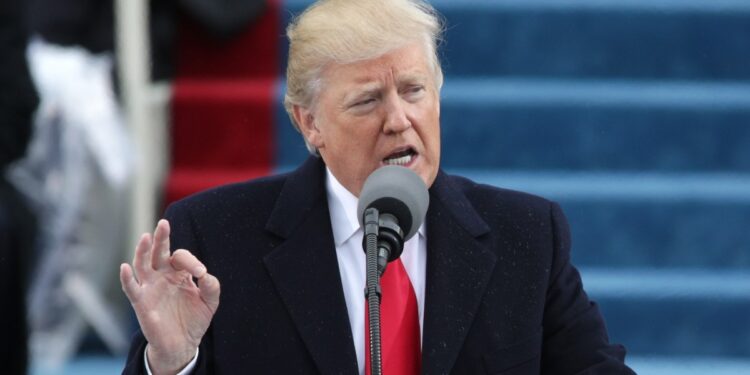Upon assuming the presidency Monday, Donald Trump is expected to immediately move to end the federal government’s recognition of transgender people, who have existed in hundreds of societies worldwide since ancient times.
In an executive order titled, “Defending Women from Gender Ideology Extremism and Restoring Biological Truth to the Federal Government,” the full text of which has not been released, Trump will reportedly mandate that the federal government acknowledge only “biological sex”—specifically, whether an individual is born with eggs or sperm.
As Trump announced in his inaugural address, “As of today, it will henceforth be the official policy of the United States government that there are only two genders: male and female.”
According to multiple reports from a briefing by unnamed White House officials, federal agencies will be instructed to classify people by biological sex on government IDs like passports, visas, and personnel documents. In a long-anticipated move, agencies also will be ordered to stop interpreting sex discrimination laws in ways that protect trans people—inviting federal workplaces, schools, and social service programs like shelters to misgender and discriminate against trans people. Transgender women in federal prison reportedly will be transferred to men’s prisons and no longer provided with gender-affirming medical treatments—potentially forcing up to 1,500 incarcerated trans women to medically detransition.
The order is expected to attempt to cut off federal funding for gender-affirming medical treatments like hormone therapy—a move that primarily affects transgender adults. About 276,000 trans adults are on Medicaid, which uses a combination of federal and state funding, raising the possibility that Medicaid coverage for gender-affirming care will be preserved in the roughly half of states that cover it. Other trans adults rely on Medicare, which covers hormone therapy as well as surgery on a case-by-case basis, and the Department of Veterans Affairs, which covers nonsurgical gender-affirming treatments. These treatments, which research suggests improve quality of life and mental health and reduce suicidality, are now in jeopardy.
Each of the new administration’s moves is expected to face immediate legal challenges. The ACLU has vowed to take the Trump administration to court “wherever we can” to defend LGBTQ rights. Federal courts, including the Supreme Court, are already engulfed in legal battles over whether the Constitution, as well as federal anti-sex discrimination laws, implicitly protect people from anti-trans discrimination. In 2023, the Montana legislature passed a law purporting to define sex as binary and biological, erasing transgender people from whole swaths of state code, but a Montana judge swiftly blocked it, declaring that it violated the state constitution.
The executive orders “do not and cannot change the law,” Chase Strangio, co-director of the ACLU’s LGBT & HIV Project, who last month became the first openly trans person to argue before the Supreme Court, wrote on Instagram. “They will be glorified press releases designed to create confusion and chaos.”
“Today’s expected executive actions targeting the LGBTQ+ community serve no other purpose than to hurt our families and our communities.”
“Today’s expected executive actions targeting the LGBTQ+ community serve no other purpose than to hurt our families and our communities,” Human Rights Campaign President Kelley Robinson said in a statement. “We are not going anywhere, and we will fight back against these harmful provisions with everything we’ve got.”
The announcement of the order Monday makes good on Trump’s campaign promises to fight so-called “gender ideology”—a term that allows him and his allies to frame their policies as attacking a belief system, rather than targeting a minority group that makes up roughly 1 percent of the population. As trans people gained more public exposure and media representation in the 2010s, and especially since the Supreme Court recognized the right to same-sex marriage in 2015, right-wing and religious conservative groups have poured time and money into turning transgender rights into a wedge issue—ultimately seeding hundreds of anti-trans bills in state legislatures over the last several years. After holding off in the 2020 election cycle, Republican politicians and PACs went all-in on anti-trans rhetoric focusing on trans athletes and pronouns.
Transgender individuals and families with gender-diverse children have been bracing themselves and preparing for the Trump crackdown. After his reelection in November, LGBTQ organizations and advocates urged transgender people to update their gender markers on documents like passports and Social Security cards. Many have rationed and stockpiled medications. Others have moved from conservative states to places like Colorado, where state law provides strong protection for queer and trans people.
On the morning of Inauguration Day, Renee, the mother of a trans teenager in Pennsylvania, woke up at 5 a.m. “shaking with anxiety and fear,” she said.
“It was already scary, even with the protections, but at least I knew that there were laws in place to protect her at school,” said Renee, who is using only her first name to preserve her daughter’s privacy. “If this executive order really goes into place, where are the safe spaces, other than home?” she wondered, her voice cracking. “I don’t have an answer, and it terrifies me.”







